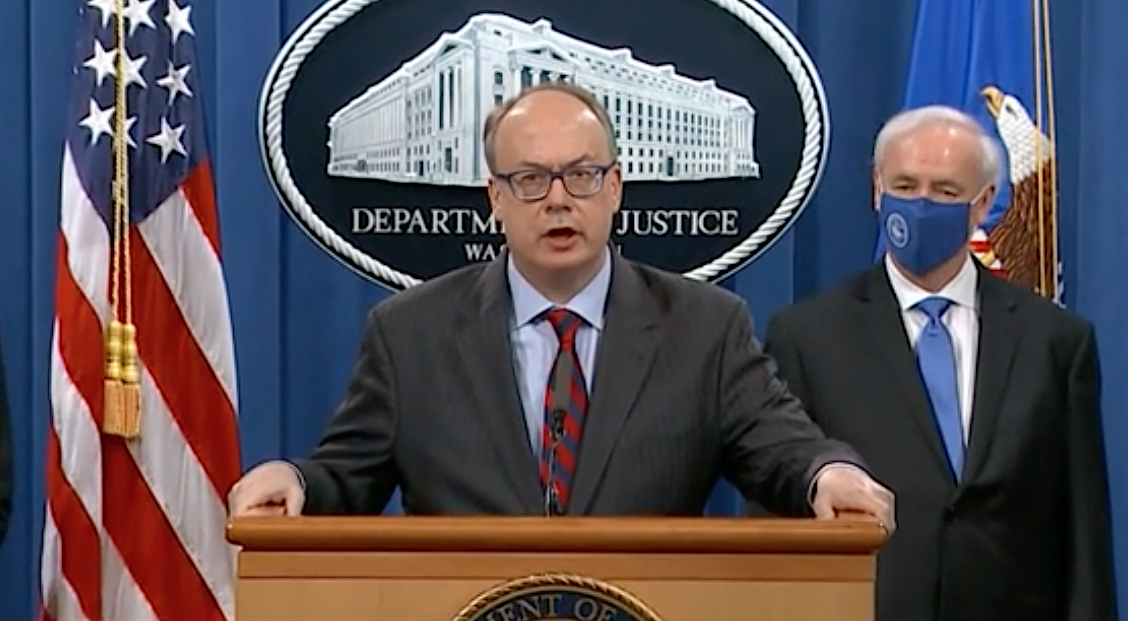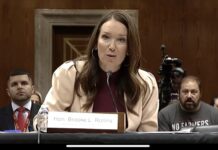
(GA Recorder) — Former President Donald Trump forced a top federal prosecutor in Atlanta to step down because he wouldn’t help Trump overturn his loss of Georgia in the 2020 presidential election, a U.S. Senate report released Thursday said.
The report, written by Senate Judiciary Committee Democrats, found that the U.S. attorney for the Northern District of Georgia, Byung Jin “BJay” Pak, resigned under pressure from the Trump White House in early January.
Pak would not substantiate unfounded claims that the election results in Georgia were fraudulent, the report said.
Trump’s attorney general, William Barr, asked Pak to make an investigation of supposedly illegal ballots carried around in suitcases “a top priority,” Pak told committee investigators in an interview made public for the first time Thursday.
Thursday’s report was only an interim account, released as committee investigators continue to gather evidence in their investigation into Trump’s efforts shortly after the November election to undermine President Joe Biden’s victory.
Though the findings aren’t final, the report adds details about Pak’s ouster and confirms it was related to his resistance to pursuing Trump’s demands to find nonexistent election fraud.
Pak’s resignation letter, submitted Jan. 4, made no mention of his reason for leaving the post he’d held since October 2017, though the move raised questions at the time because it broke with the Justice Department’s succession protocol.
Bobby Christine, then the U.S. attorney for the neighboring Southern District of Georgia, replaced Pak on an acting basis. Under normal procedure, Pak’s top deputy, Kurt Erskine, would have become the acting U.S. attorney.
A ‘never-Trumper’
In a Jan. 3 Oval Office meeting, Trump complained to acting Attorney General Jeffrey Rosen, who by then had replaced Barr, and acting Deputy Attorney General Richard O’Donoghue that Pak was a “never-Trumper,” according to the report.
Trump said he’d prefer Christine to take over the Northern District office, which includes Atlanta, because “he’ll do something about [election fraud].”

Trump was displeased that Pak, a former Republican state legislator whom Trump had appointed to the U.S. attorney post, wouldn’t back unfounded claims of election fraud related to ballots inside State Farm Arena in Atlanta.
Rudy Giuliani, a personal attorney and adviser to Trump, traveled to Georgia in early December to promote the theory that a video showed poll workers at the arena delivering suitcases full of illegal ballots.
Barr, before he stepped down as attorney general Dec. 14, asked Pak to make an investigation of Giuliani’s claim “a top priority,” Pak told committee investigators.
U.S. Sens. Jon Ossoff, (D-Ga.), and Richard J. Blumenthal, (D-Conn.) and Judiciary Committee staff members were present for Pak’s interview.
Georgia Secretary of State Brad Raffensperger’s office quickly debunked that Giuliani claim, finding instead that the supposed suitcases were secure ballot boxes holding legitimate ballots.
Pak personally reviewed video and audio from the arena and confirmed the secretary of state’s findings were valid, he said.
“I was comfortable that the main allegation that Mr. Giuliani made with respect to the secure ballot box being a suitcase full of fake ballots, that was not true,” Pak told committee investigators. “That was debunked. I was satisfied of the explanation.”
But Trump and some allies continued to push that theory and other strategies to overturn Biden’s victory in Georgia.
On Jan. 2, Trump called Raffensperger and asked him, during an hour-long call, to “find” enough ballots to change the election result.
The next day, Trump met with Rosen and Donoghue and said he wanted to fire Pak, whom he called a “never-Trumper” who wouldn’t zealously pursue fraud claims.
Donoghue resisted. But when Trump overruled him, Donoghue told him Pak planned to step down the next day anyway, though Pak had actually told colleagues he planned to stay in office until Inauguration Day.
“That’s fine,” Trump responded, according to Donoghue’s testimony. “I’m not going to fire him, then. But when his resignation comes in, it’s accepted. Tomorrow is his last day as U.S. attorney.”
Trump then suggested Christine take over the Northern District. Donoghue responded that Erskine was next in the line of succession, but Trump insisted on Christine.
Pak did submit a “very bland” letter of resignation on Jan. 4 in order to avoid disrupting a special U.S. Senate election the next day, he told investigators.
The committee report concludes that the Trump White House made inappropriate demands of the Justice Department to investigate claims of election fraud, especially in Georgia.
Mark Meadows, a former North Carolina congressman who was Trump’s White House chief of staff, asked Rosen to “investigate various discredited claims of election fraud in Georgia,” the report said.
Grassley retort
After the Democrats’ report was issued Thursday, U.S. Sen. Chuck Grassley, Iowa’s senior senator and the ranking Republican on the Judiciary panel, pushed back against it and said it vindicated Trump rather than implicating him.
The report focuses on Trump receiving advice from Jeffrey Clark, then the head of the Justice Department’s civil division, outside counsel John Eastman and others to take drastic actions to subvert the election results.
Those steps included firing the top DOJ leadership and installing Clark, sending letters to states asking them to contest the results, and suing states with voter issues.
But Trump rejected the most extreme options, Grassley said.
“The Democrats’ report makes much of efforts by individual lawyers to push the department to take these steps,” Grassley said. “But the fact is, none of these steps were taken because President Trump made the ultimate decision not to.”
Representatives for Ossoff did not return a message seeking comment Thursday. A spokeswoman for fellow Georgia Democrat Sen. Raphael Warnock also did not return a request for comment.
Both were elected in the historic special election runoff on Jan. 5, the day after Pak resigned.







